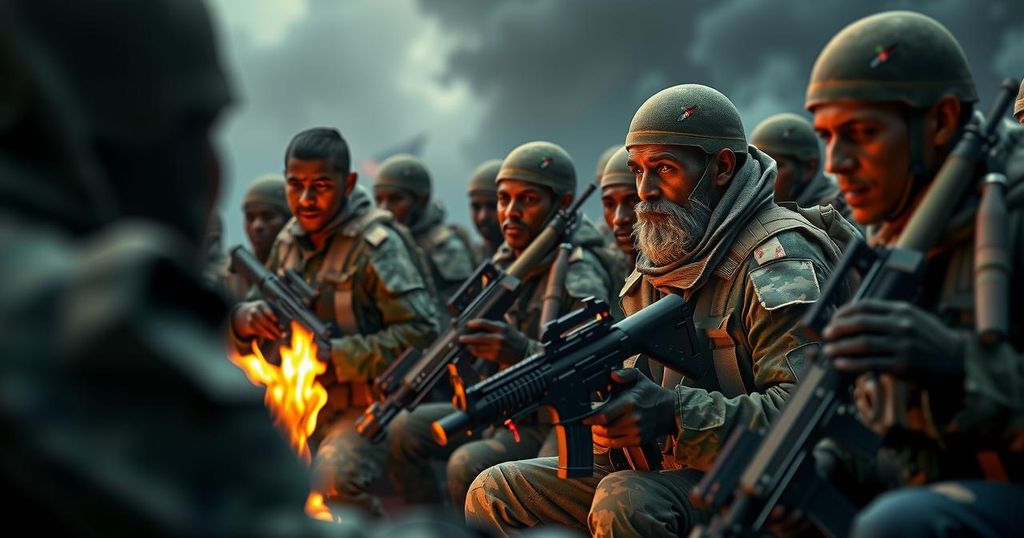C.A.R. Rebels Surrender as Chad Joins Forces for Border Peace Efforts
Several hundred rebels from the Central African Republic have surrendered their weapons to government and U.N. forces, following an agreement with Chad to secure their border. Hardship and food shortages pressured the rebels to disarm, as the government aims to reintegrate them while preparing for local elections, postponed due to insecurity. Cooperation with Chad marks a significant step towards achieving stability and peace in the region.
On Wednesday, officials from the Central African Republic (C.A.R.) announced that several hundred rebels had surrendered their weapons to government troops and United Nations forces. This development follows a recent agreement with Chad, aimed at jointly securing their shared 1,200-kilometer border. There is optimism among officials regarding the organization of local elections, initially scheduled for October but delayed due to security concerns. According to C.A.R. officials, the persistent hardship and relentless raids carried out by government forces were significant factors that compelled many rebels to lay down arms. Among those who surrendered this week was Mloubo Etienne, a 36-year-old former fighter from the Union for Peace (UPC), one of the largest armed groups in the C.A.R. He cited unbearable living conditions and a lack of food in the dense rainforests as his reasons for abandoning the rebel cause. Similar sentiments were echoed by many UPC fighters on the northern border, where Chad’s troops have disrupted regular food supplies. Furthermore, Maxime Balalou, the C.A.R.’s communication minister and spokesperson, revealed that some of the 105 fighters who disarmed in Bambari, the nation’s third-largest city, were affiliated with the UPC or the anti-balaka militia. Additionally, an operation in Kouango resulted in the disarmament of 36 fighters, including three women. The government has pledged to provide support for the reintegration of voluntarily disarmed rebels through the C.A.R. Center for Disarmament, Demobilization, and Reintegration, wherein they will receive economic and social assistance or training to join national forces. The anti-balaka has operated for ten years as a coalition of rebel factions. The government is currently focusing on disarming those who remain in hiding, warning that they will face lethal consequences if they do not surrender. The ultimate objective is to foster peace in anticipation of the local elections, which are now scheduled for December 29, contingent upon favorable circumstances. In a pivotal meeting held in Bangui on October 23, officials from both C.A.R. and Chad reached a consensus on the establishment of a cooperative security force along their extensive border. Chad has committed to deploying troops to prevent supplies from reaching rebel factions, while the C.A.R. aims to have at least half of its estimated 21,000 rebels surrender by the end of 2025, as part of a broader strategy for stabilization and peace.
The Central African Republic has faced prolonged conflict, characterized by intermittent violence involving numerous rebel factions. One of the notable groups, the Union for Peace (UPC), has contributed to the instability of the region. As the country strives towards peace and the establishment of democratic processes, recent collaborations with neighboring Chad have demonstrated a shift towards collective security initiatives. The ongoing disarmament and reintegration efforts are essential components of restoring order in a nation that has not conducted local elections for over three decades.
In summary, the surrender of several hundred rebels in the Central African Republic signifies a pivotal moment in the country’s efforts toward peace and stability. The collaboration with Chad and the initiatives for disarmament and reintegration demonstrate a commitment to resolving longstanding conflicts. As C.A.R. prepares for local elections, the government’s actions indicate a focused approach towards reducing the influence of rebel groups and fostering security in the region.
Original Source: www.voanews.com




Post Comment